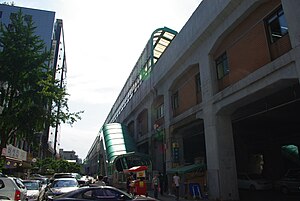Seongsu Station
|
Seongsu Station
|
|
|---|---|

Seongsu Station
|
|
| Korean name | |
| Hangul | |
| Hanja | |
| Revised Romanization | Seongsu-yeok |
| McCune–Reischauer | Sŏngsu-yŏk |
| General information | |
| Location | 100 Achasan-ro, 300-1 Seongsu 2-ga, Seongdong-gu, Seoul |
| Operated by | Seoul Metro |
| Line(s) | Line 2 |
| Platforms | 2 |
| Tracks | 4 |
| Construction | |
| Structure type | Aboveground |
| Key dates | |
| October 31, 1980 | Line 2 opened |
| Traffic | |
| Passengers | (Daily) Based on Jan-Dec of 2012. Line 2: 48,909 |
Seongsu Station (Korean: 성수역) is a rapid transit station on Seoul Subway Line 2. It is located in Seongsu-dong in the Seongdong-gu administrative district of Seoul. It is also the southeastern terminus of Line 2's Seongsu Branch to Sinseol-dong. Trains needing to be serviced take the Seongsu Branch from this station and go to the Gunja Train Depot behind Yongdap Station.
The platform is elevated and features 4 tracks. The main circle route of Line 2 runs on the inside pair of tracks while the Sinseol-dong branch is served by the outside pair of tracks. The station has four exits and is connected to two bus routes as well as a local shuttle bus which services the various apartment complexes in the area around the station. The stations services Seongsu 1ga 1 dong, Seongsu 2ga 1 dong, and Seongsu 2ga 3 dong. The area around the station is primarily commercial and light industrial but gives way to mixed-use development and residential further from station. Exits 1 and 2 service a nearby Lotte Castle apartment complex.
The station is part of the original set of stations which made up the first phase of Line 2. It was built on October 31, 1980, at the intersection of Guui Road (구의로) and Seong-Sam Road (성삼길). The initial section of Line 2 ran from Sinseoul-Dong to the Sports Complex Station in Jamsil-dong. In 1983 Seongsu Station was split as the Line 2 circle was extended by nine stations to Euljiro 1-ga Station. The Sinseol-dong line became known as a branch line at this time. It would be another eight months before the circle line was completed in May 1984.
...
Wikipedia
